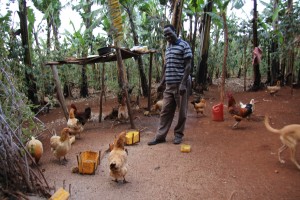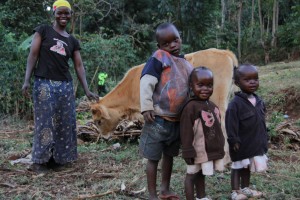Lydia Namubiru is a Partnership Analyst working with Grameen Foundation’s Community Knowledge Worker program in Uganda.

Charles Mukonyi
For a long time, Charles Mukonyi of Gamatui parish in Kapchorwa had a problem with his chickens – the hens died off soon after hatching new ones. Three months ago, he was visited by his neighbor Tabitha Salimo who told him that she had a phone that has huge amounts of agricultural knowledge to answer many of the problems farmers face. Naturally, the first thing Charles asked about was the hen problem. Tabitha checked her phone and informed Charles that his hens were likely to be catching diseases from their predecessors by sitting on the same hay when incubating eggs. She advised him change the hay for every newly incubating hen. He saw the wisdom of that and adopted the practice. He has not lost a hen since!
Around the same time, in Kapwata parish, about 60km away from Charles’ home into the slopes of mountain Elgon, another farmer faced a big eminent loss. One of Saulo Mwanga’s goats developed a disease he had not seen before - boils on the skin. He feared he would lose it. A very unfortunate possibility because, like he says, “when you lose one goat, you have lost about sh100,000” (or $50USD). Fortunately, he had an idea about where he could get help. He had been consulting Alfred Chepsikor, his area Community Knowledge Worker (CKW) for routine farming information like market prices and weather forecasts. He knew he might have an answer for the goat problem. Indeed the CKW did. Chepsikor searched his phone and saw the same symptoms described in a piece of information about goat diseases. With the symptoms’ description was a suggestion on what drugs the farmer could use to treat the goat. Neither of the farmers knew the drug but they wrote it down on a piece of paper which Mwanga went with to agricultural input stores. So important was saving his goat that Mwanga went across the border to near-by Kenya to find the drug he had been advised to use. The goat is completely healed now.

Caroline Chelangat with her children
As one traverses Kapchorwa, one finds many more success stories big and small. For Caroline Chelangat of Sipi, it is was a tip to add aloe vera to the water for her chicken that saved 10 of out of her flock of 20. Unfortunately at the time she consulted with the CKW, she already had lost the first ten. Aloe vera is known to have a medicinal properties including improving immunity to diseases. Albert Kibet, also of Kapkwata is hoping for better banana and coffee harvests this year after he started adding compost manure to his plantation on the advice of his CKW.
Asked what he would have done had the CKW information resource not existed, Mwanga says he would have just tried to guess at a solution. After all he lives 47kms uphill and away from the Kapchorwa, the nearest township where one might expect to run into an agriculturalist of any expertise. Looking at a slowly recovering coffee plant that he had sprayed against insects with a drug advised by his CKW, Mwanga says, “I might even have sprayed the plant with a drug left over from spraying the cows just to try [a solution]. If you are lucky, it works. Otherwise, you just lose it.” It is the difference a CKW makes - where farmers depended on luck in the past, they now have access to scientifically tried, proven and recommended solutions.
Tags: Agriculture, CKW, ICT4D, Uganda

